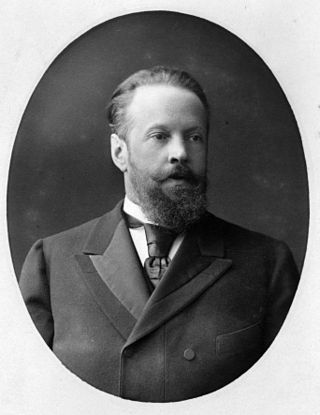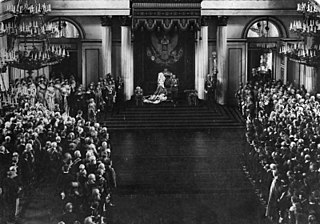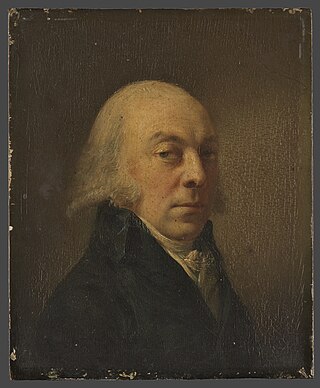
Count Sergei Yulyevich Witte, also known as Sergius Witte, was a Russian statesman who served as the first prime minister of the Russian Empire, replacing the emperor as head of government. Neither liberal nor conservative, he attracted foreign capital to boost Russia's industrialization. Witte's strategy was to avoid the danger of wars.
The Third Section of His Imperial Majesty's Own Chancellery was a secret-police department set up in Imperial Russia. As a successor-organisation to the Tayny Prikaz of 1654 to 1676, to the Privy Chancellery of 1686 to 1801 and to the Specialty Chancellery, it effectively served as the Imperial régime's secret police for much of its existence. The organization was relatively small. When founded in July 1826 by Emperor Nicholas I it included only sixteen investigators. Their number increased to forty in 1855. The Third Section disbanded in 1880, replaced by the Police Department and by the Okhrana.

The Russian Constitution of 1906 refers to a major revision of the 1832 Fundamental Laws of the Russian Empire, which transformed the formerly absolutist state into one in which the emperor agreed for the first time to share his autocratic power with a parliament. It was enacted on 6 May [O.S. 23 April] 1906, on the eve of the opening of the first State Duma. This first-ever Russian Constitution was a revision of the earlier Fundamental Laws, which had been published as the Code of Laws of the Russian Empire in 1832. It was granted during the Russian Revolution of 1905, in a last-ditch effort by the imperial government to preserve its own existence and keep the empire from disintegration.

The Russo-Turkish War (1806–1812) between the Russian Empire and the Ottoman Empire was one of the Russo-Turkish Wars. Russia prevailed, but both sides wanted peace as they feared Napoleon's moves to the east.

The Ems Ukaz or Ems Ukase, was an internal decree (ukaz) of Emperor Alexander II of Russia issued on 30 May [O.S. 18 May] 1876 banning the use of the Ukrainian language in print except for reprinting old documents. The ukaz also forbade the import of Ukrainian publications and the staging of plays or lectures in Ukrainian. It was named after the city of Bad Ems, Germany, where it was promulgated.
Narodnaya Volya was a late 19th-century revolutionary socialist political organization operating in the Russian Empire, which conducted assassinations of government officials in an attempt to overthrow the autocratic Tsarist system. The organization declared itself to be a populist movement that succeeded the Narodniks. Composed primarily of young revolutionary socialist intellectuals believing in the efficacy of direct action, Narodnaya Volya emerged in Autumn 1879 from the split of an earlier revolutionary organization called Zemlya i Volya. Similarly to predecessor groups which had already used the term "terror" positively, Narodnaya Volya proclaimed themselves as terrorists and venerated dead terrorists as "martyrs" and "heroes", justifying political violence as a legitimate tactic to provoke a necessary revolution.

Konstantin Petrovich Pobedonostsev was a Russian jurist and statesman who served as an adviser to three Russian emperors. During the reign of Alexander III of Russia, Pobedonostsev was considered the chief spokesman for reactionary positions and the éminence grise of imperial politics. Between 1880 and 1905, he served as Ober-Procurator of the Most Holy Synod, making him the non-clerical Russian official who supervised the Russian Orthodox Church.
The period from 1796 to 1855 in Russian history saw the Napoleonic Wars, government reform, political reorganization, and economic growth.

Alexander Ageevich Abaza was one of the most liberal of the advisors of Alexander II of Russia. He served as minister of finance from October 27, 1880, to May 6, 1881, and unsuccessfully urged the tsar to transform Imperial Russia into a constitutional monarchy. After Alexander II's assassination and the accession of Alexander III, reformers like Abaza were removed from power. In his career he also served as State Comptroller (1871–1874) and as chairman of State Council's Department of the State Economy. He was a recipient of the Order of the White Eagle, the Order of Saint Vladimir, the Order of Saint Anna and the Order of Saint Stanislaus.
The Separate Corps of Gendarmes was the uniformed security police of the Imperial Russian Army in the Russian Empire during the 19th and early 20th centuries. Its main responsibilities were law enforcement and state security.

Russian Armenia is the period of Armenian history under Russian rule from 1828, when Eastern Armenia became part of the Russian Empire following Qajar Iran's loss in the Russo-Persian War (1826–1828) and the subsequent ceding of its territories that included Eastern Armenia per the out coming Treaty of Turkmenchay of 1828.

Prince Pavel Dmitriyevich Tsitsianov, also known as Pavle Dimitris dze Tsitsishvili, was an Imperial Russian general of Georgian noble origin who played a prominent role in the Russian conquest of the South Caucasus. He served as the Russian Commander-in-chief in the Caucasus from 1802 to 1806 and commanded Russian forces in the Russo-Persian War of 1804–1813 until his assassination near Baku in 1806.

Arshak Ter-Gukasov was a Lieutenant-General of the Russian Empire. Born to an Armenian family in Tiflis, he started his military career in 1850 and was subsequently involved in the war in the Caucasus. After being promoted to the rank of lieutenant general, and serving various governmental posts, he was then assigned as the Yerevan Forces commander of Russia's army during the Russo-Turkish War of 1877–1878. Owing to his successes in battle, Arshak Ter-Gukasov was awarded medals by Imperial Russia and other foreign powers.

Count Sergei Grigoryevich Stroganov was a Russian nobleman, statesman, art historian, archaeologist, collector, and philanthropist. He was a member of the highly successful and prominent Stroganov family He also founded the Stroganov Moscow State Academy of Arts and Industry.

The House of Melikov, the Russified version of Armenian last name Melikyan was an Armenian noble family in the Kingdom of Georgia and later in the Russian Empire.

Alexander I, nicknamed "the Blessed", was Emperor of Russia from 1801, the first king of Congress Poland from 1815, and the grand duke of Finland from 1809 to his death in 1825. He ruled Russia during the chaotic period of the Napoleonic Wars.

Dmitri Feodorovich Trepov was Head of the Moscow police, Governor-General of St. Petersburg with extraordinary powers, and Assistant Interior Minister with full control of the police. His attempts to restore order were overwhelmed by the revolution of 1905; he retained influence with the Tsar Nicholas II, when appointed as the Commandant of the Imperial Palace.

Alexander II was Emperor of Russia, King of Congress Poland and Grand Duke of Finland from 2 March 1855 until his assassination in 1881. Alexander's most significant reform as emperor was the emancipation of Russia's serfs in 1861, for which he is known as Alexander the Liberator.

"Loris-Melikov's constitution" was a planned but unimplemented political reform suggested by count Mikhail Loris-Melikov. It was introduced to the Russian Emperor, Alexander II, in January 1881.

Princess Olga Alexandrovna Yurievskaya was the natural daughter of Alexander II of Russia by his mistress, Princess Catherine Dolgorukova. In 1880, she was legitimated by her parents' morganatic marriage.

















